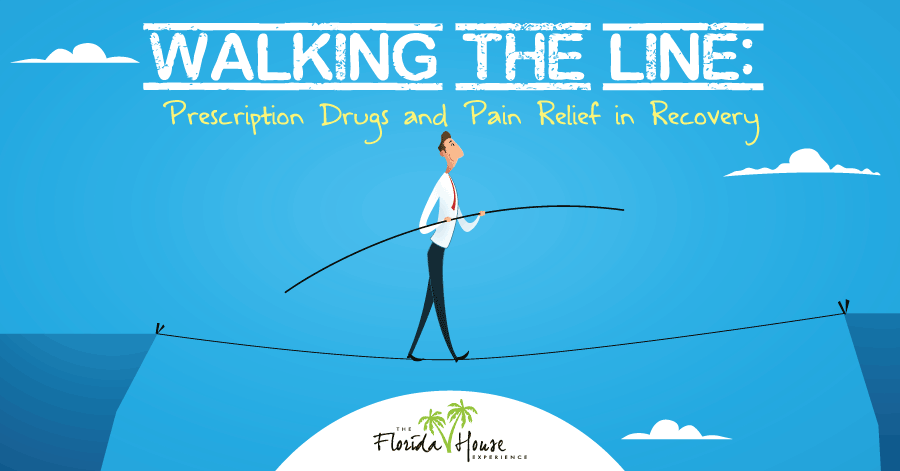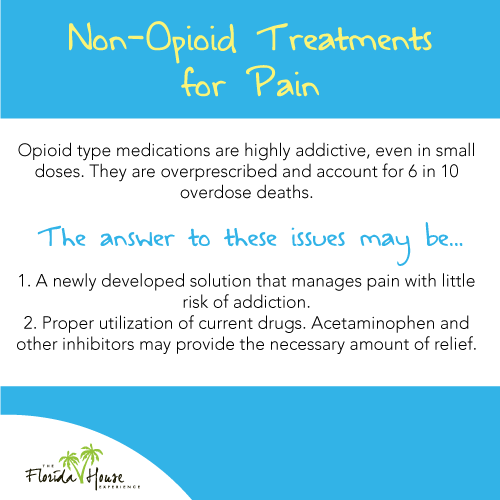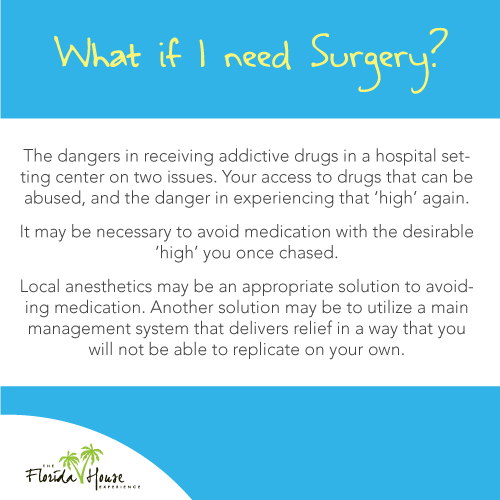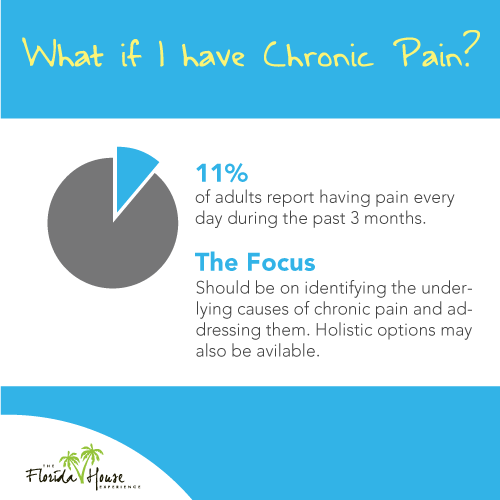
During the recovery process, your goal is to abstain from any type of drug that could be a potential threat to your sobriety. It takes just one experience to open the door to relapse, no matter how hard you’ve worked to avoid it. However, pain is a part of life. You may need to manage a simple headache or prepare for a larger health event like surgery.
Every situation is unique, and that’s why working with your counseling team in aftercare at FHE Health can help.
Prescriptions and Addiction Recovery
It’s not uncommon for people who go through residential rehabilitation to leave feeling strong and motivated. Some even promise themselves they’ll never come back. Then, their health worsens or they get a diagnosis that requires the use of a controlled substance.
It’s a situation that can cause relapse even if the drug at issue is different from what the addict previously used. For example, a recovering heroin addict diagnosed with bipolar disorder would normally need to take medication for that condition, but doing so could be a risk no matter what the nature of the new medication because of the substance abuse disorder.
In every situation, you, your doctor, and your counselor need to fully understand the risks and rewards of any substance and explore all alternative options.
Innovative Solutions: Non-Opioid Treatments for Pain
 One of the biggest concerns for relapse comes from pain management and the required medications. Opioid-type pain medications are highly addictive, even in small doses. It’s unrealistic, though, for a person to expect to never need to use pain medications for the rest of their life. That’s why researchers are working to develop non-opioid treatment options.
One of the biggest concerns for relapse comes from pain management and the required medications. Opioid-type pain medications are highly addictive, even in small doses. It’s unrealistic, though, for a person to expect to never need to use pain medications for the rest of their life. That’s why researchers are working to develop non-opioid treatment options.
The U.S. Centers for Disease Control and Prevention states that six out of ten overdose deaths are due to opioids. They also note that the quantities of opioids prescribed in the U.S. in 2015 were enough for every person in the country to have been medicated for 24 hours a day for three weeks. If there are medications capable of reducing pain without having the same addictive quality as opioids, it makes sense to use them.
Some of these include analgesics such as acetaminophen, some cyclooxygenase-2 selective inhibitors and NSAIDs. These medications may have other side effects, but they aren’t addictive in nature.
There are also non-opioid options for anticonvulsants, including gabapentin and carbamazepine, and serotonin, norepinephrine reuptake inhibitors and tricyclics are alternatives for antidepressants. All of these can also be used in the treatment of chronic, acute pain conditions such as diabetic neuropathy and fibromyalgia.
IV Treatments
In some hospital settings, doctors proactively work to limit the amount of opioid-based pain medication delivered to patients after procedures. Instead of prescribing traditional pain medication, they use an IV to deliver very intense pain relief to a specific area, which sidesteps the digestive system. Epidurals and intra-articular glucocorticoid injections go right to the source of pain, turning off the nerve signals that cause it.
This type of treatment can work well for joint-related injuries and illness. It also aids in chronic pain that results from arthritic conditions.
What Happens If You Need Surgery?
 Imagine being in a car accident and suffering from numerous injuries. The thought of having to tough it out is hard to do. Doctors continue to work on treatment options that are non-addictive for use after surgical procedures.
Imagine being in a car accident and suffering from numerous injuries. The thought of having to tough it out is hard to do. Doctors continue to work on treatment options that are non-addictive for use after surgical procedures.
For example, nerve blocks and injections at the site can minimize any pain you feel. A muscle spasm treated with a local anesthetic can help reduce the pain and improve mobility without the risk of using an addiction-forming drug. Various surgical centers are focusing on sending individuals home with pain pumps that deliver this type of medication to the localized area.
Is It Okay to Take Medications for a Headache?
It’s always best to turn to your doctor or counselor for more insight into treatment for a headache or other type of pain. In most cases, you’ll want to avoid any habit-forming types of drugs. Taking acetaminophen, for example, is an acceptable option for most people. When this over-the-counter medication doesn’t work, your doctor can prescribe medications that are more effective without the risk of opioid abuse.
How Can You Manage Chronic Pain Without Pain Medications?
 Working with a pain management team is perhaps one of the most important steps for those who have chronic pain along with a substance abuse disorder. The National Health Interview Survey published by the National Institutes of Health found that in 2012, some 25.3 million adults (roughly 11.2 percent) had pain every day during the previous three months. What’s more, the U.S. Centers for Disease Control and Prevention found in 2016 that the number had climbed to 50 million Americans or 20.2 percent.
Working with a pain management team is perhaps one of the most important steps for those who have chronic pain along with a substance abuse disorder. The National Health Interview Survey published by the National Institutes of Health found that in 2012, some 25.3 million adults (roughly 11.2 percent) had pain every day during the previous three months. What’s more, the U.S. Centers for Disease Control and Prevention found in 2016 that the number had climbed to 50 million Americans or 20.2 percent.
For those with chronic pain, the focus should be on resolving the underlying cause. This may mean surgical procedures to eliminate nerve damage, physical therapy to improve mobility or, in some cases, weight loss or exercise to improve function.
There are also a number of holistic treatment options that help many men and women to do well with chronic pain management. This includes acupuncture, chiropractic care, exercise therapy and cognitive behavioral therapy. Massage therapy, yoga and mindfulness meditation are also methods that can help to minimize pain.
What Should You Do When You’re Not Sure?
When determining what’s okay to take or not, be sure your sponsor is always just one phone call away. Any medication that causes a chemical high is one you want to avoid. At the same time, focus on treating the underlying health conditions that cause any pain you’re experiencing. Seek out others who have been in your place before. Surely, you aren’t the only person in recovery who has experienced pain!
Seeking Help for Substance Use Disorders at FHE Health
It’s not possible to expect a life without pain, but you can live a life without active addiction. At FHE Health, we work closely with patients who need ongoing treatment and support for all forms of addiction. Contact us today to start on the path towards recovery.






